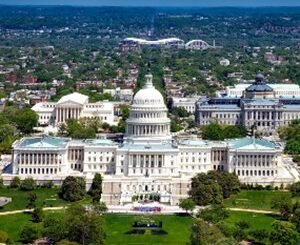(Bloomberg) – A divided U.S. Supreme Court threw out a decades-old legal doctrine that empowered federal regulators to interpret unclear laws, issuing a blockbuster ruling that will restrict environmental, consumer and financial-watchdog agencies.
The 6-3 decision, which came in a fight over a fishing-industry regulation, is a long-sought triumph for opponents of big government. The court overturned Chevron v. Natural Resources Defense Council, a 1984 ruling that Democratic administrations had used as a legal building block for new regulations.
The latest ruling raises new questions about longstanding rules as well as the power of agencies going forward, particularly in emerging fields including cryptocurrency and artificial intelligence. It puts more onus on Congress to directly tackle policy issues and gives lower-court judges a mandate to rein in regulators when they exceed their authority.
The Supreme Court majority said the Chevron decision improperly transferred the power to interpret the law from the judiciary to federal agencies. Under Chevron, judges were required to defer to agencies that offered a reasonable interpretation of an unclear statute.
“Chevron was a judicial invention that required judges to disregard their statutory duties,” Chief Justice John Roberts wrote for the court.
Chipping away. The conservative-dominated court had already chipped away at Chevron and slashed agency authority in recent years. The court in 2022 required regulators to have clear congressional authorization before acting on “major questions.”
The majority tempered the latest ruling to some degree by saying past decisions that upheld regulations on the basis of Chevron would remain in force.
The Chevron ruling originally was a victory for the deregulatory agenda of Environmental Protection Agency Administrator Anne Gorsuch Burford, the mother of future Justice Neil Gorsuch. Justice Antonin Scalia hailed Chevron in a 1989 law review article as providing “needed flexibility, and appropriate political participation, in the administrative process.”
Gorsuch joined Roberts in the majority, along with fellow conservatives Clarence Thomas, Samuel Alito, Brett Kavanaugh and Amy Coney Barrett.
But conservatives eventually came to loathe the doctrine as liberal administrations relied on it to justify broad regulations. Then-President Barack Obama used Chevron to defend a rule encouraging states to adopt more renewable power. And President Joe Biden said courts should defer to regulators seeking to expand federal oversight of waterways.
The case centered on a federal requirement that some herring boats host government-approved observers aboard their vessels and cover an estimated $710 daily cost. Two groups of fishing companies sued, saying Congress didn’t authorize the National Marine Fisheries Service to require them to pay for the observers.
Two federal appeals courts said the rule was based on a reasonable interpretation of the 1976 Magnuson-Stevens Act, which governs the management of marine fisheries in federal waters.
The monitoring program is part of a broader effort to conserve and manage the US Atlantic herring fishery, which stretches from North Carolina to the Canadian maritime boundary. Even before the Supreme Court ruling, the program had been on hold because Congress hadn’t appropriated money to cover the administrative costs assigned to the federal government.
The cases are Loper Bright Enterprises v. Raimondo, 22-451, and Relentless v. Department of Commerce, 22-1219.
This article was originally posted at www.worldoil.com



Be the first to comment